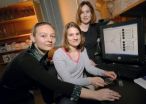Dr Gundi Knies a researcher based at ISER said: "Despite the seemingly high levels of happiness amongst young people in the UK, our children's well-being has remained about the same since the Unicef report in 2007, which rated Britain's children as some of the most unhappy in the developed world. Understanding Society research suggests that a focus on just improving income and material deprivation does not necessarily represent real improvements in quality of life as they are perceived by children themselves."
The results also show that young people are less materialistic than adults in their assessment of happiness. A much greater influence on a child's happiness is whether they live with both parents and the happiness of their parents' relationship, and in particular their mother. In families where the child's mother is unhappy in her relationship, only 55 per cent of young people say they are 'completely happy' with their family situation – compared with 73 per cent young people whose mothers are 'perfectly happy' in their relationships.
Understanding Society also asked parents and children living at home questions about family relationships, including partners, and their level of happiness with these relationships. The answers from 11,825 adults and 1,268 young people (aged 10-15) were analysed and compared. Together these findings reveal the complex influences of different family relationships on a child's happiness:
60 per cent of the children said they were 'completely satisfied' with their family situation
children in lone-parent families were less likely to report themselves completely happy with their situation
having older siblings is not related to children's happiness with their family, but having younger siblings in the household is associated with lower levels of satisfaction and this effect is greater the more younger siblings present in the household
children who quarrel more than once a week with their parents, and don't discuss important matters with them have only a 28 per cent chance of rating themselves completely happy with their families
children who eat an evening meal with their family at least three times a week are more likely to report being completely happy with their family situation than children who never eat with their family
hours spent watching TV are completely unrelated to a young person's happiness with their family situation
Dr Maria Iacovou, who worked on the family relationship findings said: "Families are a big part of every child's life, and our research highlights just how much family relationships matter for children's well-being. Over the years, as we follow the lives of the families in Understanding Society, we'll build up an even better picture of how children's lives are affected by all kinds of factors. Understanding Society is really set to become a fantastic resource for anyone interested in the well-being of children."
INFORMATION:
The first findings book is published online at http://research.understandingsociety.org.uk/findings/early-findings. Individual chapters are also available to download.
The first set of data from Understanding Society is now available for researchers to use in their analysis. It can be accessed via the Economic and Social Data Service.
FOR FURTHER INFORMATION, CONTACT
Christine Garrington, ISER (Tel: 01206 874823, email: cgarr@essex.ac.uk)
ESRC Press Office:
Danielle Moore (Tel: 01793 413122, email: danielle.moore@esrc.ac.uk )
Jeanine Woolley (Tel: 01793 413119, email: jeanine.woolley@esrc.ac.uk )
NOTES FOR EDITORS
1. The findings above are taken from two separate chapters of 'Understanding Society: Early findings from the first wave of the UK's household longitudinal study'. Chapter 2 'Family Relationships' by John Ermisch, Maria Iacovou and Alexandra J Skew and chapter 3 'Life Satisfaction and Material Well-being of Young People in the UK' by Gundi Knies. Chapter 2 focuses on family relationships analysing the relationship between partners and between parents and their children. Chapter 3 analyses the relationship between child satisfaction (as reported by the child) and family income. The full chapters can be found at www.understandingsociety.org.uk/findings
2. Gundi Knies is a Senior Research Officer. Her research interests include income distribution, poverty and neighbourhood effects analysis using a range of datasets, including the German Socio-economic Panel Survey (SOEP) and the British Household Panel Study (BHPS). Maria Iacovou is a Research Fellow whose research interests include young people, incomes and poverty, education and family structure and family formation. Both are based at the Institute of Social and Economic Research (ISER) at the University of Essex.
3. Understanding Society is a world leading study of the socio-economic circumstances in 40,000 British households. The study allows for deeper analysis of a wide range of sections of the population as they respond to regional, national and international change. Understanding Society will greatly enhance our insight into the pathways that influence peoples longer term occupational trajectories; their health and well-being, their financial circumstances and personal relationships. Understanding Society also breaks new ground with its interdisciplinary focus. The study will capture biomedical data on 20,000 participants and place this alongside rich social histories, helping us weigh the extent to which people's environment influences their health.
4. Understanding Society has been commissioned by the Economic and Social Research Council (ESRC). The Research Team is led by the Institute for Social and Economic Research (ISER) at the University of Essex. The National Centre for Social Research (NatCen) delivers the Study.
5. The ESRC have contributed £27 million towards the funding of Understanding Society, and have successfully secured a total of £19.4 million from the Department for Business, Innovation and Skills Large Facilities Capital Fund. A further £2.61 million has been secured from a consortium of Government Departments. This funding will support the first five waves of the study until 2015. It is envisaged that the study will continue for up to 20 years.
6. The ESRC is the UK's largest organisation for funding research on economic and social issues. It supports independent, high quality research which has an impact on business, the public sector and the third sector. The ESRC's total budget for 2010/11 is £218 million. At any one time the ESRC supports over 4,000 researchers and postgraduate students in academic institutions and independent research institutes. More at www.esrc.ac.uk
END



